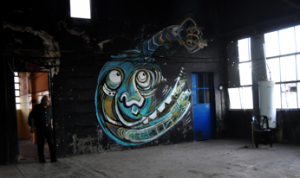Cecilia presents on grassroots arts factories and the city
On 5/07/14 Cecilia delivered a presentation at the international conference ‘Lisbon Street Art and Urban Creativity’ that took place at the Faculty of Fine Arts, University of Lisbon, Portugal. The event brought together artists, sociologists, urban planners, art historians and anthropologists to discuss the role of culture in urban transformation and place-making, tactical urbanism in public space, participatory cultural development, and the implications of the institutionalisation of graffiti, among others. Cecilia’s talk was entitled ‘Urban Creativity from Below’ and examined cases of community-led conversion of industrial factories into arts venues in Latin American cities.
Abstract. Culture has become central to processes of urban transformation in contemporary cities. From converting industrial buildings to developing whole districts into arts squares and creative clusters, culture functions today as the cornerstone of a new orthodoxy by which cities seek to enhance their competitive position (Miles and Paddison, 2005:833). Among these entrepreneurial urban policies, culture-led urban regeneration has risen as a global phenomenon, widely acclaimed by policymakers. While official culture-led urban regeneration has been widely documented, urban revitalisation from below has been largely overlooked. This paper engages with the question of urban creativity in Latin American cities by examining how grassroots interventions shape public culture in Buenos Aires and Rio de Janeiro. Through desk-based research on the conversion of industrial factories into cultural venues, the paper argues for the value of informal grassroots interventions for developing inclusive creative cities. By bringing to the fore alternatives to exclusionary strategies for urban renewal, the paper seeks to de-centralise the production of knowledge about creative cities.
